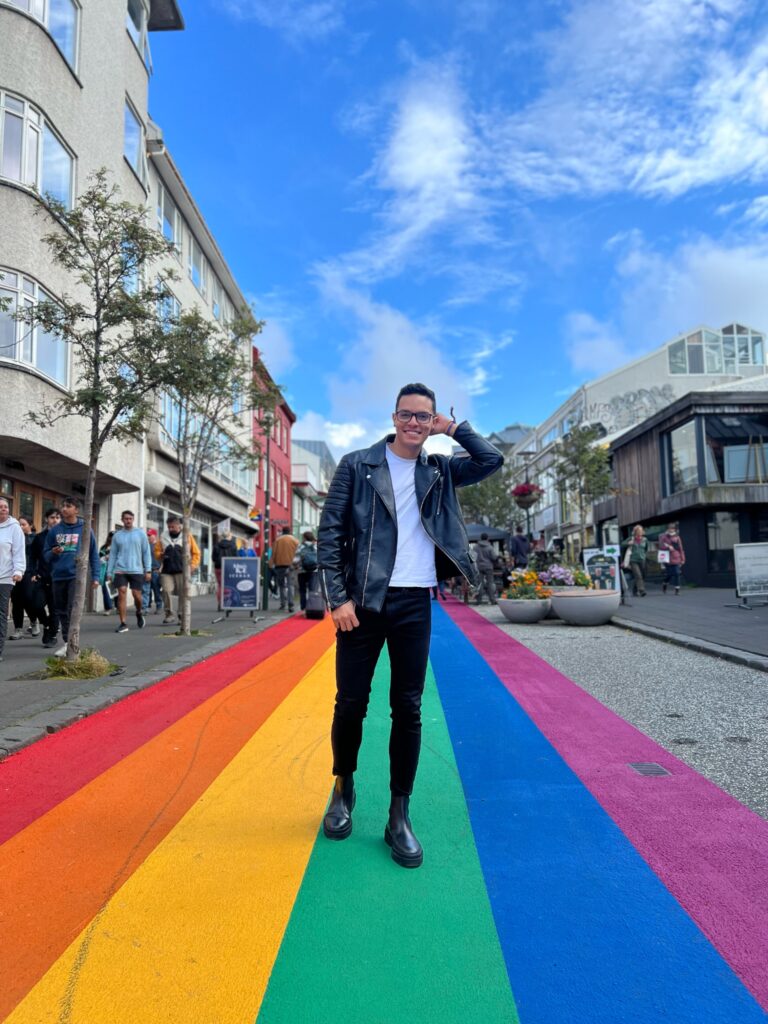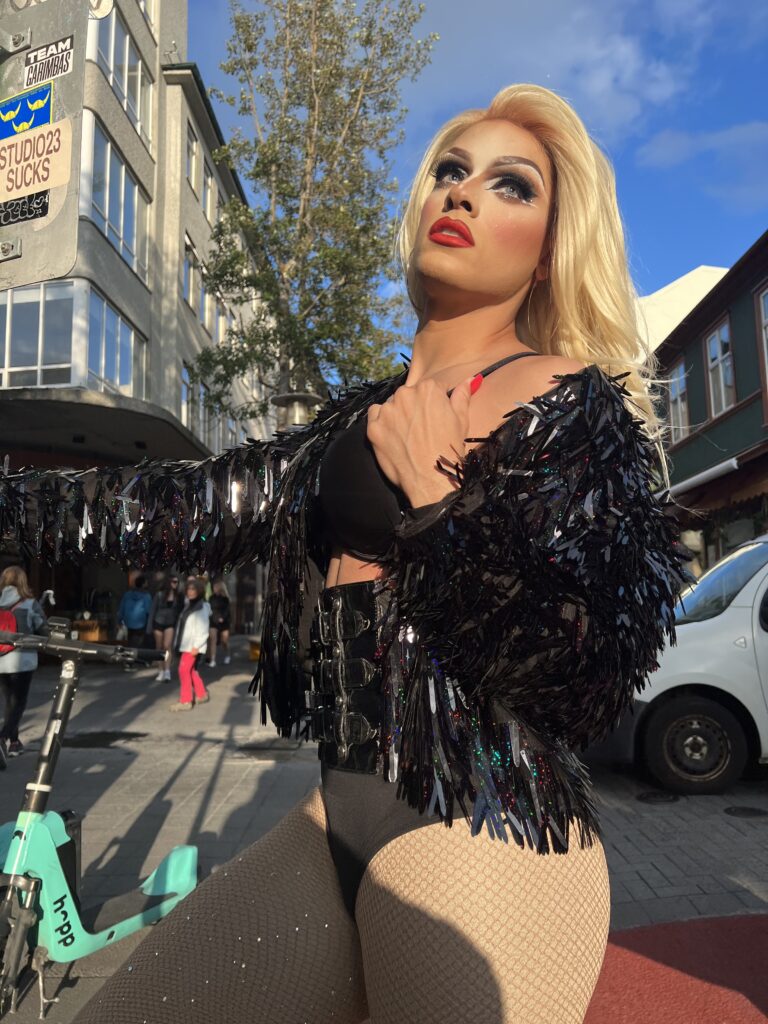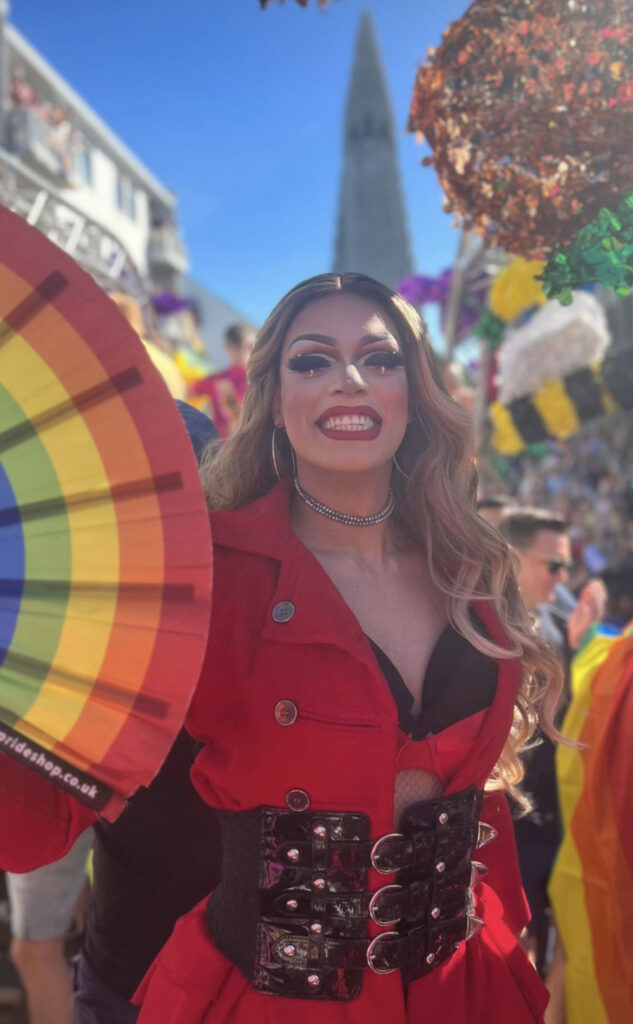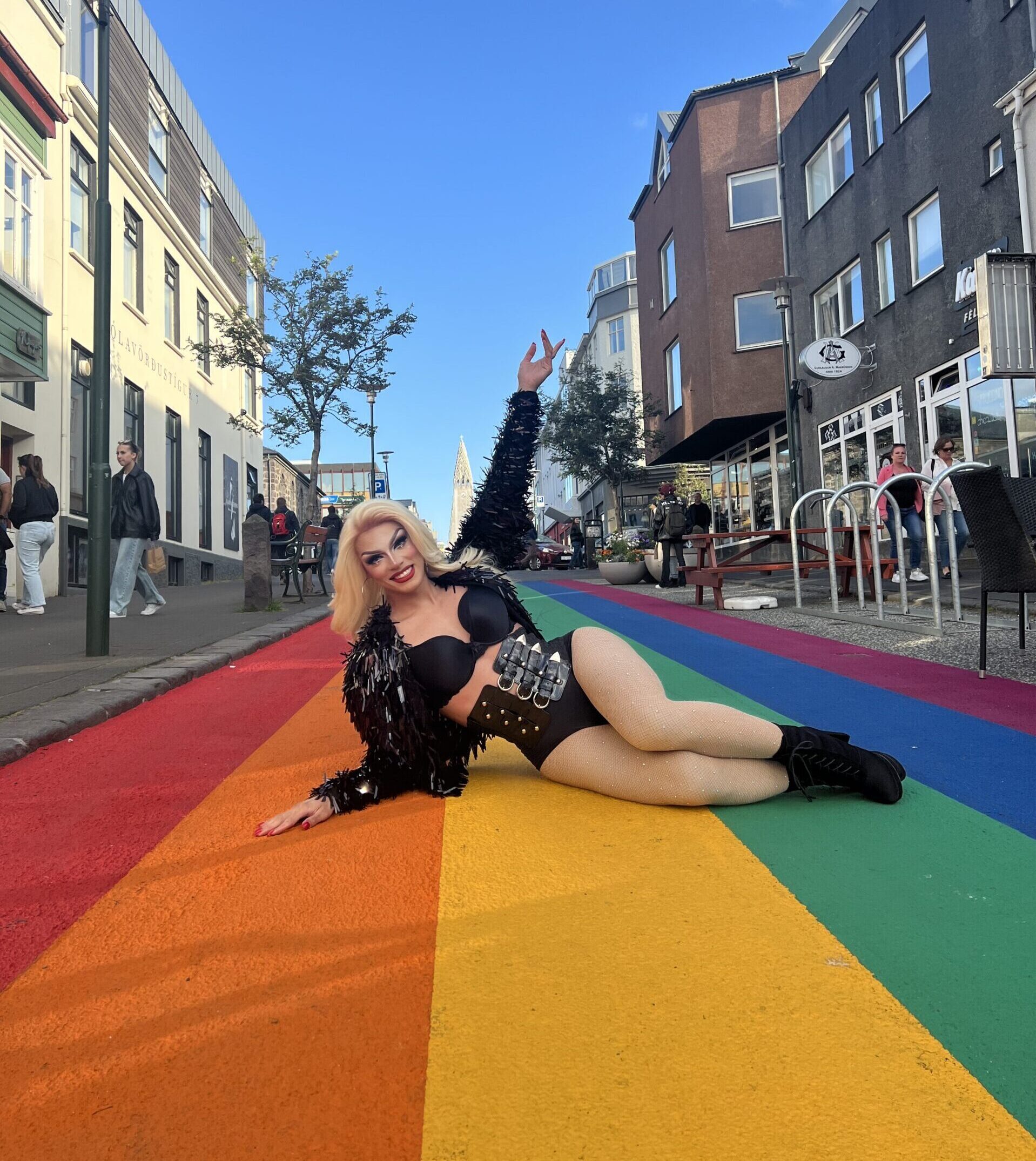The island’s newest sparkling drag sensation on her journey from Venezuela to Iceland.
During Reykjavík Pride (Hinsegin dagar) a new queen stepped on the stage. For many locals it may have seemed like an act that was just in town for the festivities, however it was none other than Crisartista, aka Rayner Milano. It was Cris’ first performance and she also became a highlight of Páll Óskar’s Saturday Palli Ball party and pride float. Crowds went wild and the Icelandic drag scene welcomed her with opening arms. With a spicy latin style, gorgeous looks, and dance moves to boot, Crisartista is one of the freshest additions to the Icelandic drag scene in years. GayIceland sat down to chat with Rayner about their drag persona and their harrowing journey to Iceland.
Tell us about your drag name. Where did it come from?
“It’s because I’m an actor, a dancer. I studied arts in Venezuela and I decided to create a character. Why Cris? I don’t know if you know who Cristina La Veneno is, she was one of the first trans women appearing in a public interview in Spain. When I saw her for the first time I was so surprised. Her history is so amazing; she was in jail, she went through so much hardship. She always had the right answer, the perfect attitude, the best attitude. So I decided to take this Cris from her and artista because I feel that I’m an artist.
Cris’s personality outside is glamorous, so shiny, so much shine, the most shine that I can. Inside, oh my god, she’s so in love with the stage but also loves to make people happy. I think that’s the most important thing. It’s not the kind of drag that’s going to make fun of bottoms and tops. I hate those kinds of jokes because if I’m going to pay for a drag show I don’t want you with the microphone to start making fun of people, I hate that. I hate that kind of cheap and basic humor, so Cris is not like that.

She’s more like ‘let’s have fun.’ She’ll flirt with a lot of people, even though I like boys Cris loves to flirt with anyone. I think it’s more spicy and lovely. I also think that the point of going to see Cris is to lose the time and enjoy yourself for a moment. If the song is three minutes long, I want you to forget everything and just enjoy it. It’s just this kind of Broadway style. It’s less comedy, more show and dance, a mix like that.
I’m coming from another style of drag. In Venezuela we have this culture of nieces and queens of Miss universe, this pageantry. We have that so much in our blood that all the drag queens feel that they want to be beautiful women, that’s the stereotype. In Europe and America the style is so different. It was a challenge for me, you can even see the style of makeup. How it is now is bigger, more expressive, too much, and I love it.”
How long have you been doing drag for?
“In general six or seven years. There’s not many places to perform in Venezuela. It’s just where all the queer bars are, but it’s not many, there’s only two or three in Caracas. There’s not so many opportunities to do drag, there’s not that many places. I have been doing it a lot and many people know me there. But it’s weird, you’re just secure when you’re inside a bar. It’s just secure there. Outside of the clubs or the party it’s difficult, so difficult.
That’s something that scared me all the time working there. I’d need to have a taxi waiting right outside, a driver that I can trust. I always had people I could trust because you don’t know who can come and do something to you. You can’t ever walk from one bar to another in drag, never. Not in drag, not at night, definitely not alone. No, no, no.”
What was it like your first time in drag in Iceland?
“I walked from my house near Hlemmur to Kiki [in drag]. I was with my best friend. I said ‘I need to take all these fears away, let’s walk.’ It was amazing!
It feels so good when people say to you ‘oh my good she looks amazing.’ Or they don’t say anything or they’re just walking.
It’s good, it doesn’t feel weird, it doesn’t feel unsafe. It doesn’t feel incorrect. That’s what happened to me before. It felt incorrect. Sometimes it felt like I was doing something wrong even when I was openly gay because the social behavior is like that. Here it’s ok and people are just thinking it’s just happening, it’s just drag.
Tourists! I took some photos on the rainbow street and tourists were freaking out ‘oh my god she’s so beautiful’ it was amazing, it was so surprising. This is a different world for me and I love it.”
People there disappear. Sometimes it’s like ‘we haven’t seen Crisartista in a while.’ You don’t know what happened. Gone and nobody knows.
How long have you been in Iceland?
“It took me so long to get here, so long. I arrived in November of last year. The situation in Venezuela is not as good as you want. But finally I’m here and after all these years when I didn’t think this drag character Crisartista wasn’t going to come out again but here it feels so secure. Here it feels good, there’s a good mood. It pushed me to do it.
I’m so happy with everything here, how secure I feel, how LGBTQ+ people feel here in Iceland. It’s so amazing and it’s so different from where I’m from. For me it’s like heaven.“
Why Iceland? Why move here?
“I actually had an amazingly scary moment there with some homophobia before I came to Iceland, it was in 2019. I think I was close to dying [in that situation], that’s why I stopped doing drag in Venezuela.
All the meetings, everything about human rights and protests I was doing there, I was the host of the event. So that made me the face of these organizations but it also put me in the eye of homophobic people. So I stopped after that.
Then I started looking on Google ‘best country for LGBTQ+ people’ and Iceland came up. That’s why I decided to move here. From that moment I said decided I needed to be safe.”
What happened in 2019?
“When I was at the front of all the LGBTQ+ protests in Caracas they started to follow me in the streets because I was almost the only guy there with long hair, so I was so easily recognized. The guys that beat me were police. One of them told me ‘don’t go to the police because we are the police.’ So if the police are doing this, who’s going to protect you? It was a shock for me.
Then in the street I started to feel persecuted and police all the time asking ‘hey, who are you? Where are you going? Come here. Have you been talking to about what happened to you?’ It was so terrible. It was at that point I decided to stop. Stop doing shows, stop going to the LGBTQ+ meetings, I stopped social media, I stopped everything. I needed to stop my life because I realized that if I kept going with this I’d probably not survive.
Last week thirty three guys were at a party [in Venezuela]. A house party, nothing crazy. And the police came to the house asking ‘why are so many gay men here?’ trying to arrest them. They put them in jail, just because.
People there disappear. Sometimes it’s like ‘we haven’t seen Crisartista in a while.’ You don’t know what happened. Gone and nobody knows. It happens there if you speak loudly about something that they don’t want you speaking about. It’s so hard.
Now, thank god there’s a bit more organizations than when I stopped and that’s good. I think it’s amazing but I also think it’s difficult. They need to fight a lot. Probably in my time, three years ago, I was more alone than they are now, more organized. I don’t know. I hope that they can make more visibility. What happens there is something like what happened to me. I didn’t say anything. I hid it. Like me so many people hide it and if you don’t say anything it’s like nothing happened.
Even when you say something about it the police don’t do anything, the government doesn’t do anything. We’re not important to them. Anywhere something could happen, homophobic attacks. It’s still happening there, it’s something I can’t control. That’s why I said if I can’t control it, if I can’t change it, I will go because I don’t want to live my life like that.”

What’s it like for the LGBTQ+ community in Venezuela?
“Last week thirty three guys were at a party [in Venezuela]. A house party, nothing crazy. And the police came to the house asking ‘why are so many gay men here?’ trying to arrest them. They put them in jail, just because. Three or more gays together is basically a crime. It’s turning that way. They’re trying to shut up anyone who’s talking about human rights like me. They are trying to police anyone that disagrees with them.
I have this trauma from what happened to me in Venezuela because I was in drag going from one disco to another one. I was with my mom too. Some guys came, they hit us. I ran with my mom to the police of course in a little bit of makeup, no hair, no hips, no wig. But the police said ‘well yeah if you’re in the streets like this it can happen, you were asking for it’ basically. They just laughed at me.
All of this blocked me. All of this blocked my feelings to do drag again. Here I feel so good, I’m doing so well, I’m so happy. Last week I was in Kiki, first time out in drag here and people were like ‘oh my god you look so good!’”
How does it feel now doing drag in Iceland?
“Here you have more opportunities than just the bar. [In Venezuela] I kind of had opportunities outside of the bars but it was not so accepted. I felt like sometimes it was forced. Not like here where out of the clubs you can perform other places and it’s going to be nice. They’re not, it’s so closed.
They’re performing a lot but it’s something that you need to hide. You can see on social media but you don’t know how it really is. The same club looks better than when I was there. It looks fantastic, the lights, the ladies look gorgeous but outside of that it’s still dangerous, it’s still police trying to attack you whenever they want.
It was at that point I decided to stop. Stop doing shows, stop going to the LGBTQ+ meetings, I stopped social media, I stopped everything. I needed to stop my life because I realized that if I kept going with this I’d probably not survive.
Even on social media you can see people are still doing [drag] but it’s behind that. I know how it is. It’s nice to show it online but I know the truth of what it’s like there. Here I can share and 100% of what I’m sharing on social media is real. It’s safe.
I was talking to one of my drag friends [in Venezuela] and she was asking me ‘how do you like it’ and I just said ‘it’s incredible! I’ve never felt like this before.’ Ya know, you feel right. You feel good. You feel that you’re not doing something wrong and it’s amazing this feeling. This is my place. I feel like this is a place I want to live and do so many things.”
How’s it going with Útlendingastofnun (the Directorate of Immigration)?
“I don’t know who, or I don’t know why or what happened but with immigration I have a strong case but they still said no to me. It was surprising for me and my lawyer. I’m appealing. I have all the proof. I’m showing that I was in danger in Venezuela. Why would you say no? How can you say ‘no, it’s secure, you need to go back to your country.’ You really think I’m going to be secure there?
I’m in the process of appealing [my case]. We’ll see what happens. I have a permit until they say yes. Or maybe they’ll say no. I don’t know. There’s nothing secure about it. Even when I have proof. It’s such a strong case my Icelandic lawyer said ‘I’ve never seen a case like yours.’
That is the only thing that feels weird, that I’m questioning ‘why?’ But outside of that it’s so amazing. People here are amazing. I feel secure. And also I’m so happy. So how can, here in Iceland, they not see that people come here to be free? ‘You need to go back, because your country is fine.’ It’s hard.”
How do you think the appeal will go?
“My lawyer has said that this appeal is to a different committee and that the appeal committee is more humanist. Hopefully they see me as a human and not just a number. Because that happens here, immigration sees you as a number.
If you’ve come so far because you really need it… it’s not easy. It’s not cheap. You’re going so far for you and your life, you hope they say yes, you hope they say ‘ok, you have one year, show me what you can offer.’ I think that’s a good way to see it, but I don’t know.
I can’t work. I don’t have a kennitala. I can’t do anything because it’s not legal. I’m just waiting. I’m hoping that everything goes well.
I’m 27. I just want to have an opportunity. I’m not coming to this country for free. I don’t want anything for free. I can work, I’ve been working all my life. I don’t want anything for free. That’s probably what immigration needs to know here. Immigrants come to work, they come to build, they come to help. I hope they change their mind.
They changed the law already. I came in November and they changed the law in January. They’re applying the laws of January to me even though I came before.”
What was the journey like to Iceland?
“Oh my god it was so difficult because leaving Venezuela there were zero opportunities. Saving money is impossible, just to buy food. Living there you have no water in your home six days out of every seven. You need to pay a crazy extra for normal water. You can imagine how difficult it is.
I was working more, saving more to leave. It was a huge time to do it, it took me two or three years to come to Iceland. I’m so happy with what I’m getting here. I’ve been meeting incredible people. I’m so happy and so grateful. I feel that everything is better.
I traveled from Venezuela to the Dominican Republic, Dominican Republic to Spain, Spain to Iceland. It was like two or three days. It’s difficult because you need to put your life in a bag.
I don’t know who, or I don’t know why or what happened but with immigration I have a strong case but they still said no to me. It was surprising for me and my lawyer. I’m appealing. I have all the proof. I’m showing that I was in danger in Venezuela. Why would you say no?
I didn’t have the chance to bring anything connected to drag. I cried a lot because the old me is still in Venezuela. All the makeup, brushes, heels, clothes, everything because I didn’t think it was going to happen anymore. I brought the essentials, regular clothes.
Then when this started I was like ‘hey, I need to start creating a new version of Cris.’ It’s so different from me. People are so kind, people are helping me a lot starting with my boyfriend, Páll Óskar and Venezuelan friends. There’s a huge Venezuelan community here that’s supporting me so much. I didn’t know it but we’re so many here. They’re asking me what I need, what they can do, what we can do together, it’s so amazing.
Now this new version of Cris is on a whole new level in so many ways, mentally, emotionally, all but in a good way.”

You’re dating an Icelander, right?
“My boyfriend is Icelandic, yes. I think we’ve been together since my first month here. Gunnar has been an immense support to me in many positive aspects of my life here in Iceland. We’re waiting for an answer. I wasn’t sure about starting drag again, to perform again. I don’t know why but I was thinking that was the past for me, but he is amazing.
I remember one of the first days that I told him that I love the makeup business and that I used to do drag and all the history about it and he only heard me. Then the next day he brought big bags full of makeup, brushes, some wigs and heels, so many things, and he just told me ”keep doing it, don’t stop doing something that you love.” That was amazing. So many things living together that makes us closer every day, we are happy together.
He was supportive and said ‘hey, you’re going to do it, it’s something that you like. Here it’s so secure.’ We are waiting for an answer [from immigration], a positive one, because we want to keep going together, living together, sharing moments and creating memories together.
I’m also trying to learn Icelandic. It’s so difficult, but I’m going to do it. I want to have better communication in society and with his family. His mother, his father and his brothers have always made me feel at home. I want to learn Icelandic to communicate more with them and his nephews.”
Do you miss Venezuela?
“I just miss my family, I don’t miss my home, I don’t miss my country. It’s sad sometimes when I think about it, but it is what it is. I can’t do something that makes me feel so damaged. I think that I was so damaged there. It was so hard.
It’s so difficult. I was talking to my grandma right before this. She calls me almost every day and she knows everything. She’s like my best friend. She’s one of the biggest that I miss, my sister, my mom. I’m also doing this for them because helping me or doing this for me is going to be reflective of them. I can help them. If I don’t do it no one’s going to do it. That’s it. I also want to give them a little bit of what they gave me. They helped me, they protected me, they took care of me. They supported me so much.
I’m the kind of person that believes that you can build the opportunities, you can build the way, because I did it. I mean I built my way from [Venezuela] to here, so I can do anything.
My grandma always supported me. She never showed me she was ashamed, and was always proud of me in every moment. My mom and my sister too. I never felt like I needed to hide something in my house. I didn’t need to say anything to them. When the time came [to come out] it was just ‘yeah we know it, we knew it.’ It was like ok, nice, because this is my family. I am so lucky in that way. I’ve heard so many stories about people coming out and getting kicked out. It’s so terrible, thank god I wasn’t in that situation because I was in a supportive family. That helped me a lot.”
What do you want to do in Iceland?
“I love makeup. I want to study makeup here. I hope to do it when they approve me, that’s one of the first things I’m going to do, makeup school.
I want to work here in the theaters, companies in performance, and movies. I want to be connected to all of that. That’s what I want, that’s what I dream about. The makeup business here might not be huge here but I want it. I’m the kind of person that believes that you can build the opportunities, you can build the way, because I did it. I mean I built my way from [Venezuela] to here, so I can do anything.”


